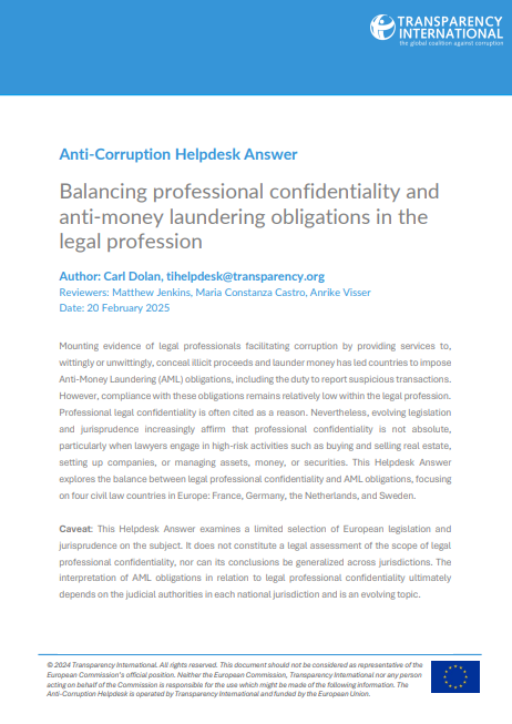- Home
- Anti-Corruption Helpdesk
- Balancing professional confidentiality and anti-money laundering obligations in the legal profession
Balancing professional confidentiality and anti-money laundering obligations in the legal profession

This Anti-Corruption Helpdesk brief was produced in response to a query from one of Transparency International’s national chapters. The Anti-Corruption Helpdesk is operated by Transparency International and funded by the European Union.
Query
How can lawyers balance legal privilege and their anti-money laundering obligations? What considerations and evidence are relevant?
Summary
Mounting evidence of legal professionals facilitating corruption by providing services to, wittingly or unwittingly, conceal illicit proceeds and launder money has led countries to impose Anti-Money Laundering (AML) obligations, including the duty to report suspicious transactions. However, compliance with these obligations remains relatively low within the legal profession. Professional legal confidentiality is often cited as a reason. Nevertheless, evolving legislation and jurisprudence increasingly affirm that professional confidentiality is not absolute, particularly when lawyers engage in high-risk activities such as buying and selling real estate, setting up companies, or managing assets, money, or securities. This Helpdesk Answer explores the balance between legal professional confidentiality and AML obligations, focusing on four civil law countries in Europe: France, Germany, the Netherlands, and Sweden.
Caveat
This Helpdesk Answer examines a limited selection of European legislation and jurisprudence on the subject. It does not constitute a legal assessment of the scope of legal professional confidentiality, nor can its conclusions be generalized across jurisdictions. The interpretation of AML obligations in relation to legal professional confidentiality ultimately depends on the judicial authorities in each national jurisdiction and is an evolving topic.
Main Points
- Legal professionals often play a major role in enabling corruption and money-laundering through their ability to disguise the origins of dirty money.
- Nevertheless, compliance with the requirements in anti-money laundering legislation to report suspicious activity has been historically very low in the legal profession, as flagged by the Financial Action Task Force (FATF) among other watchdogs.
- Professional confidentiality or legal professional privilege is often cited as a reason by lawyers in many jurisdictions as to why they cannot or will not report. Obligations of professional confidentiality are an important feature of the legal profession and essential to uphold the right to a fair trial and the rule of law.
- FATF guidance and legislation in many jurisdictions, such as the EU, have tried to balance these competing obligations by defining which circumstances would require lawyers to report their clients without breaching their confidentiality.
- These circumstances mainly concern ‘economic’ activities of lawyers, while protecting confidentiality for legal advice and legal representation.
- While AML requirements have been enacted in many jurisdictions and upheld by the courts as lawful, reasonable and proportionate, compliance remains an issue due to a lack of enforcement and resistance from many legal professionals.
Authors
Carl Dolan
Reviewed by
Matthew Jenkins, Maria Constanza Castro, Anrike Visser (TI-S)
Date
21/02/2025

